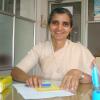
Alfred Palan, a young volunteer, helps a girl in the kitchen of the Marian House of Charity at Versova, a suburb of Mumbai, western India. (Lissy Maruthanakuzhy)
It is late evening. Noises inside the Marian House of Charity have subsided. Sr. Valencia Possa and her companions are tucking their children into bed, three in each room, after the evening meal.
"Each of them needs special attention," Possa says as she unbuckles a child from his chair to put him on the bed. When the children — all with mental and physical disabilities — are in bed, the sisters and their volunteers get ready to retire for the night, each going to separate rooms where the children sleep.
"Our children need our constant help, night and day. So we do not have separate rooms for sisters," Possa, a diminutive nun in a gray habit and white veil, told Global Sisters Report.
"We call all of them children although they are between 12 and 60. They have not grown mentally," the nun explained, sitting on a chair as three residents in their 20s crawl past her on the floor.
She is a member of the Minor Carmelites of Charity, an Italian order that manages the Marian House of Charity, hidden away among trees at the dead end of Versova, a remote suburb of Mumbai, India's commercial capital. The house has 29 residents with mental and physical disabilities, including 14 who are in wheelchairs and unable to do anything by themselves.
"We take only mentally challenged and handicapped children. Our children are abandoned by relatives who found it difficult to take care of them. We give them a home and treat them as part of our family," Possa explained.
She says many such children come to them, "but we take only limited numbers so that we can look after them well."
The sisters and volunteers never leave the residents alone, she says.
Sr. Annmaria Capiluppi, the delegate superior who also works in the house, says that their place is difficult to reach. "There is a parish nearby, but there is no proper road to come here. Visitors hire a vehicle to come, and walk miles to the bus stand when they go back."
However, people come looking for the house when they are in need. "Even if we do not take them, we give them food and other materials," Capiluppi explained.




